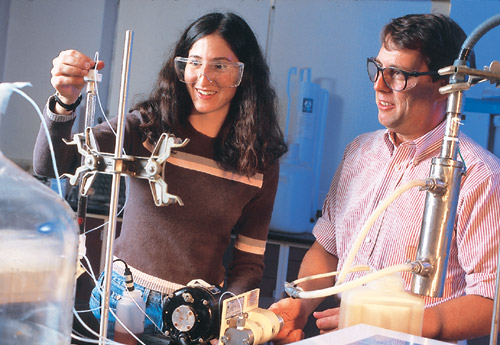Marquis Scholar Jessica Molek’s summer research project in magnetic water treatment may one day help industries do some cleaning chores in a cheaper, greener way.
A chemical engineering from Reedsville, Pa., and a graduate of Indian Valley High School, Molek was a participant in Lafayette’s distinctive EXCEL Scholars program, in which students assist faculty with research while earning a stipend. She worked with Arthur D. Kney, assistant professor of civil and environmental engineering, and Javad Tavakoli, associate professor of chemical engineering.
She made a presentation on the research at the 15th annual National Conference on Undergraduate Research, March 15-17, hosted by the University of Kentucky.
MWT is sometimes employed in industry to reduce or eliminate scale-formation in conduits and boilers, but the method is not conventional, explains Kney.
“Chemical-free water treatment is a desirable technique for treating wastewater streams for the simple reason that costly chemicals are not used and unnecessary sludges are not produced,” Kney says. “MWT is such a treatment, although its use is limited because the dynamics of the treatment process are not fully understood.
Molek’s experiments involved finding out what effect magnetic field has on ions in solution.
“We used a glass tube partially filled with ion-exchange material,” she explains. “At both ends of the glass tube were small holes where a solution of ions would enter and exit the system. By analyzing the effluent — the solution exiting the system — we learned more about the behavior of a variety of ions in solution with and without a magnetic field.”
Kney calls Molek an excellent student assistant. “She took on a lot of responsibility and dealt with concepts that she won’t learn in class until senior year,” he says. “She got things done.”
Kney joined the Lafayette faculty in 1999. He holds master’s degree in civil engineering and a doctorate in environmental engineering from Lehigh University. He has 10 years’ experience with Merritt/Osborn Environmental Consulting, Inc., Newtown, Pa. His teaching areas include environmental site assessment, geotechnical engineering, water supply and pollution control, planning and design, and engineering professionalism and ethics.
Tavakoli, a faculty member at Lafayette since 1988, holds a doctorate from the New Jersey Institute of Technology and a master’s degree from the Illinois Institute of Technology. His teaching areas include design analysis and synthesis, kinetics and reactor design, and environmental engineering. Among his research interests are industrial wastewater treatment, renewable energy sources, and hazardous waste treatment.
“I’ve gotten a lot of attention from the professors, and I’ve learned more about engineering in general. That’s one reason why I decided to try this,” says Molek, who plans to become an environmental engineer. “The professors are great. I love how we could talk about ideas. They accepted my ideas, and I learned a lot from them.”
“Working in the lab every day gave me experience that I could have never obtained working in a class with a lab once a week,” Molek continues. “I became very comfortable with the lab equipment and was able to conduct a set of tests only having an objective, not a detailed procedure like I used in a lab class settings.
“I found it very motivating that the experiments I performed and the data I obtained influenced our future planning,” she says. “My problem-solving skills improved as I compared, contrasted and looked for patterns in my results. I learned to think in new ways as I worked backward from a hypothesis to methodically prove or disprove an idea. My self-confidence was greatly improved as I was given the chance to come up with my own hypothesis and allowed to proceed in the direction I thought best.”
Molek is a member of Lafayette’s varsity track and field team. This year she was a resident adviser in Marquis Hall.

NSF Graduate Fellowship. Jessica Molek ’03 received a three-year Graduate Fellowship from the National Science Foundation. One of her Lafayette research mentors was Arthur Kney, assistant professor of civil and environmental engineering.
